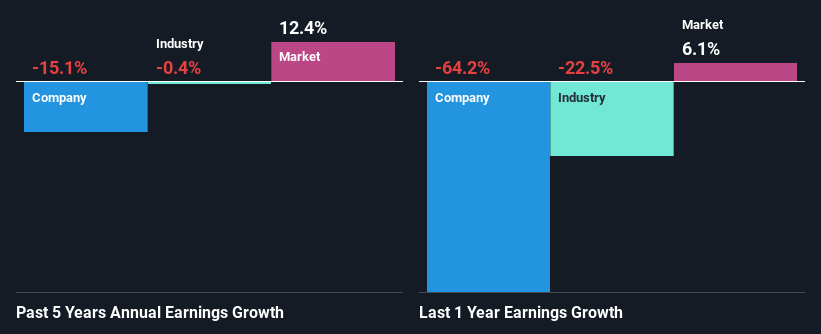- United Kingdom
- /
- Consumer Durables
- /
- LSE:BWY
Weak Financial Prospects Seem To Be Dragging Down Bellway p.l.c. (LON:BWY) Stock

Bellway (LON:BWY) has had a rough three months with its share price down 19%. Given that stock prices are usually driven by a company’s fundamentals over the long term, which in this case look pretty weak, we decided to study the company's key financial indicators. In this article, we decided to focus on Bellway's ROE.
Return on equity or ROE is a key measure used to assess how efficiently a company's management is utilizing the company's capital. Simply put, it is used to assess the profitability of a company in relation to its equity capital.
Check out our latest analysis for Bellway
How To Calculate Return On Equity?
The formula for ROE is:
Return on Equity = Net Profit (from continuing operations) ÷ Shareholders' Equity
So, based on the above formula, the ROE for Bellway is:
3.8% = UK£131m ÷ UK£3.5b (Based on the trailing twelve months to July 2024).
The 'return' is the yearly profit. Another way to think of that is that for every £1 worth of equity, the company was able to earn £0.04 in profit.
What Is The Relationship Between ROE And Earnings Growth?
We have already established that ROE serves as an efficient profit-generating gauge for a company's future earnings. Depending on how much of these profits the company reinvests or "retains", and how effectively it does so, we are then able to assess a company’s earnings growth potential. Generally speaking, other things being equal, firms with a high return on equity and profit retention, have a higher growth rate than firms that don’t share these attributes.
A Side By Side comparison of Bellway's Earnings Growth And 3.8% ROE
It is quite clear that Bellway's ROE is rather low. Even compared to the average industry ROE of 6.0%, the company's ROE is quite dismal. Given the circumstances, the significant decline in net income by 15% seen by Bellway over the last five years is not surprising. We believe that there also might be other aspects that are negatively influencing the company's earnings prospects. For instance, the company has a very high payout ratio, or is faced with competitive pressures.
Furthermore, even when compared to the industry, which has been shrinking its earnings at a rate of 0.4% over the last few years, we found that Bellway's performance is pretty disappointing, as it suggests that the company has been shrunk its earnings at a rate faster than the industry.

The basis for attaching value to a company is, to a great extent, tied to its earnings growth. What investors need to determine next is if the expected earnings growth, or the lack of it, is already built into the share price. Doing so will help them establish if the stock's future looks promising or ominous. Is BWY fairly valued? This infographic on the company's intrinsic value has everything you need to know.
Is Bellway Using Its Retained Earnings Effectively?
Bellway's declining earnings is not surprising given how the company is spending most of its profits in paying dividends, judging by its three-year median payout ratio of 52% (or a retention ratio of 48%). With only very little left to reinvest into the business, growth in earnings is far from likely. You can see the 3 risks we have identified for Bellway by visiting our risks dashboard for free on our platform here.
Moreover, Bellway has been paying dividends for at least ten years or more suggesting that management must have perceived that the shareholders prefer dividends over earnings growth. Existing analyst estimates suggest that the company's future payout ratio is expected to drop to 39% over the next three years. Accordingly, the expected drop in the payout ratio explains the expected increase in the company's ROE to 8.3%, over the same period.
Summary
On the whole, Bellway's performance is quite a big let-down. Because the company is not reinvesting much into the business, and given the low ROE, it's not surprising to see the lack or absence of growth in its earnings. That being so, the latest industry analyst forecasts show that the analysts are expecting to see a huge improvement in the company's earnings growth rate. To know more about the latest analysts predictions for the company, check out this visualization of analyst forecasts for the company.
Valuation is complex, but we're here to simplify it.
Discover if Bellway might be undervalued or overvalued with our detailed analysis, featuring fair value estimates, potential risks, dividends, insider trades, and its financial condition.
Access Free AnalysisHave feedback on this article? Concerned about the content? Get in touch with us directly. Alternatively, email editorial-team (at) simplywallst.com.
This article by Simply Wall St is general in nature. We provide commentary based on historical data and analyst forecasts only using an unbiased methodology and our articles are not intended to be financial advice. It does not constitute a recommendation to buy or sell any stock, and does not take account of your objectives, or your financial situation. We aim to bring you long-term focused analysis driven by fundamental data. Note that our analysis may not factor in the latest price-sensitive company announcements or qualitative material. Simply Wall St has no position in any stocks mentioned.
About LSE:BWY
Good value with reasonable growth potential.
Similar Companies
Market Insights
Community Narratives



